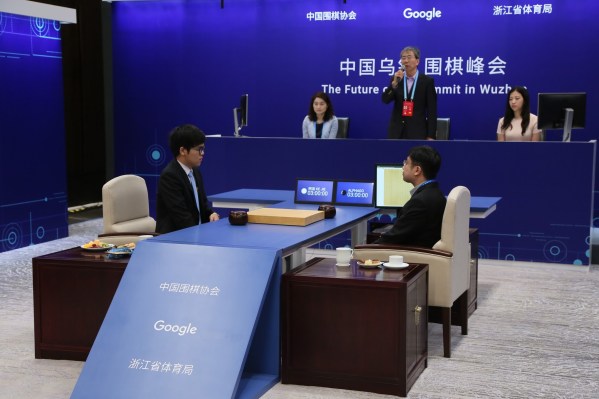Google’s AlphaGo AI has once again made the case that machines are now smarter than man — when it comes to games of strategy, at least.
AlphaGo made its name last year when it defeated high-profile Go player Lee Sedol 4-1, but now it has beaten the world’s best player of Go, the hugely complex ancient strategy game. Today, it won against Go world champion Ke Jie to clinch a second, decisive win of a three-part series that is taking place in China this week.
19-year-old Ke Jie narrowly lost the first time, but this time AlphaGo forced its Chinese opponent into conceding. That’s despite Ke Jie playing “perfectly” at the beginning of the tie, according to AlphaGo’s analysis.
“I’m putting my hand on my chest, because I thought I had a chance. I thought I was very close to winning the match in the middle of the game, but that might not have been what AlphaGo was thinking. I was very excited, I could feel my heart thumping!” he said in a post-tie press conference.
There’s still another game to be played, but, irrespective of that result, AlphaGo has defeated the man universally acknowledged to be the best player of man’s most complicated strategy game. That’s another milestone to chalk up — even though there’s been plenty of controversy because the live-stream can’t be viewed in China.
AlphaGo was created by London-based DeepMind, which was acquired by Google for around $500 million in 2014. Beyond winning showcase matches with the world’s top Go players, DeepMind believes its technology has practical and everyday uses that can “solve intelligence and make the world a better place.”
Things haven’t gone to panned out that way just yet. Instead, DeepMind has been mired by controversy. A data-sharing partnership with the UK’s National Health Service, initially heralded as having the potential to optimize medical care to reduce the number of preventable deaths, ran into issues when it was recently judged to have no lawful basis.
Critics have seized on the data transfer of 1.6 million patients’ medical records to the Google-owned company as part of the project. The original arrangement remains under investigation by the UK’s data protection watchdog, the ICO.
